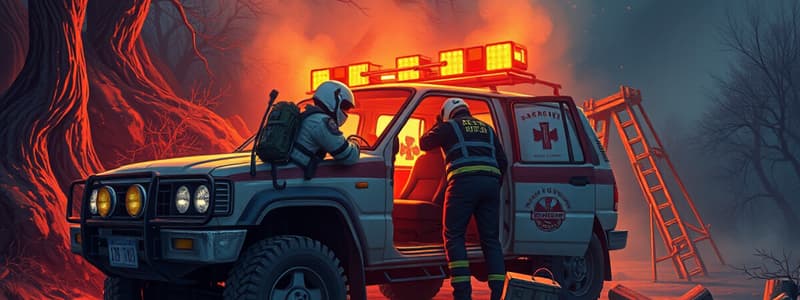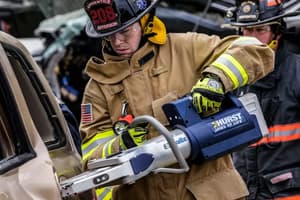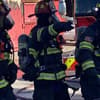Podcast
Questions and Answers
Once entrance and access to the patient have been provided, you should:
Once entrance and access to the patient have been provided, you should:
- Begin treating his or her injuries
- Allow extrication to commence
- Perform a primary assessment (correct)
- Administer high-flow oxygen
The reasons for rescue failure can be recalled by the mnemonic FAILURE. According to this mnemonic, the 'U' stands for:
The reasons for rescue failure can be recalled by the mnemonic FAILURE. According to this mnemonic, the 'U' stands for:
- Underestimating the logistics of the incident (correct)
- Undertrained to correctly utilize equipment
- Underutilizing personnel at the scene
- Unprepared to effectively manage the scene
When removing a critically injured patient from his or her vehicle, you should:
When removing a critically injured patient from his or her vehicle, you should:
- Release c-spine
- Remove them using a short backboard
- Move them in one fast, continuous step
- Protect the cervical spine during the entire process (correct)
Which of the following is a typical function of the rescue team?
Which of the following is a typical function of the rescue team?
When determining the exact location and position of the patients in a wrecked vehicle, you and your team should routinely consider all of the following, except:
When determining the exact location and position of the patients in a wrecked vehicle, you and your team should routinely consider all of the following, except:
Situational awareness is MOST accurately defined as:
Situational awareness is MOST accurately defined as:
The EMT's role at the scene of a search and rescue attempt is to:
The EMT's role at the scene of a search and rescue attempt is to:
A 19-year-old female has just been extricated from her severely damaged car. She is on a long backboard and has been moved to a place of safety. As your partner maintains manual stabilization of her head, you perform a rapid assessment. The patient is unresponsive, has slow and shallow respirations, and has bilaterally closed femur deformities. You should:
A 19-year-old female has just been extricated from her severely damaged car. She is on a long backboard and has been moved to a place of safety. As your partner maintains manual stabilization of her head, you perform a rapid assessment. The patient is unresponsive, has slow and shallow respirations, and has bilaterally closed femur deformities. You should:
Upon arriving at the scene of a law enforcement tactical situation, you should ensure your own safety and then:
Upon arriving at the scene of a law enforcement tactical situation, you should ensure your own safety and then:
In contrast to simple access, complex access:
In contrast to simple access, complex access:
Disentanglement involves:
Disentanglement involves:
You are attempting to gain access to a patient who was injured when his truck struck another vehicle from behind. The patient is conscious and alert, but is screaming in pain. You try to open the door, but it is locked. You should:
You are attempting to gain access to a patient who was injured when his truck struck another vehicle from behind. The patient is conscious and alert, but is screaming in pain. You try to open the door, but it is locked. You should:
Trench collapses usually involve large areas of falling dirt that weigh approximately _______ per cubic foot.
Trench collapses usually involve large areas of falling dirt that weigh approximately _______ per cubic foot.
Your primary concern when arriving at the scene of a motor vehicle crash is:
Your primary concern when arriving at the scene of a motor vehicle crash is:
Which of the following is the best example of gaining simple access to a patient?
Which of the following is the best example of gaining simple access to a patient?
Extrication is defined as:
Extrication is defined as:
If a technical rescue team is required at the scene, but is not present when you arrive, you should:
If a technical rescue team is required at the scene, but is not present when you arrive, you should:
The scene size-up at a motor vehicle crash or other incident:
The scene size-up at a motor vehicle crash or other incident:
Which of the following situations would require the use of a specialized rescue team?
Which of the following situations would require the use of a specialized rescue team?
Which of the following statements regarding trench rescue is correct?
Which of the following statements regarding trench rescue is correct?
Flashcards
Primary Assessment
Primary Assessment
Checking a patient's condition after rescue access, before treating injuries or oxygen.
FAILURE Mnemonic
FAILURE Mnemonic
Identifies reasons for rescue failures, including underestimating incident logistics (U).
Cervical Spine Protection
Cervical Spine Protection
Protecting the neck of critically injured patients during vehicle extrication.
Situational Awareness
Situational Awareness
Signup and view all the flashcards
Patient Location
Patient Location
Signup and view all the flashcards
EMT Role in Search and Rescue
EMT Role in Search and Rescue
Signup and view all the flashcards
Unresponsive Patient Ventilation
Unresponsive Patient Ventilation
Signup and view all the flashcards
Incident Commander
Incident Commander
Signup and view all the flashcards
Simple vs. Complex Access
Simple vs. Complex Access
Signup and view all the flashcards
Disentanglement
Disentanglement
Signup and view all the flashcards
Locked Vehicle Entry
Locked Vehicle Entry
Signup and view all the flashcards
Trench Collapse Hazard
Trench Collapse Hazard
Signup and view all the flashcards
Scene Size-Up
Scene Size-Up
Signup and view all the flashcards
Extrication
Extrication
Signup and view all the flashcards
Technical Rescue Team
Technical Rescue Team
Signup and view all the flashcards
Vehicle Crash Scene Safety
Vehicle Crash Scene Safety
Signup and view all the flashcards
Ground Vibration Hazards
Ground Vibration Hazards
Signup and view all the flashcards
Specialized Rescue Teams
Specialized Rescue Teams
Signup and view all the flashcards
Study Notes
Vehicle Extrication and Special Rescue
- Perform a primary assessment of the patient after providing access before treating injuries or administering oxygen.
- The mnemonic FAILURE highlights reasons for rescue failure; "U" indicates underestimating logistics of the incident.
- Protect the cervical spine of critically injured patients during extrication from vehicles; this is essential for spinal protection.
- Rescue teams typically provide safe entry and access to patients but can also assist with emergency care if needed.
- When locating patients in a wrecked vehicle, the make and model are less important than vehicle position and potential hazards.
- Situational awareness is recognizing issues upon arrival and acting to avoid negative impacts during rescue efforts.
- EMTs stand by at the command post during search and rescue operations until the person is found, ensuring organized operations.
- For an unresponsive patient on a backboard with slow respirations, direct your partner to begin ventilatory assistance as priority intervention.
- Upon arrival at a tactical situation, report to the incident commander for instructions after ensuring personal safety.
- Complex access involves forcible entry into a vehicle, contrasting with simple access methods like unlocking doors.
- Disentanglement means removing a patient from a dangerous position using established extrication techniques.
- If a patient's vehicle door is locked, first ask the patient if they can unlock it, rather than forcing entry.
- Trench collapses can have falling dirt weighing approximately 100 lbs per cubic foot, posing significant risks.
- Prioritize surveying the area for hazards first upon arriving at a motor vehicle crash scene.
- Simple access examples include entering a vehicle through an open window versus more complex methods like breaking glass.
- Extrication is defined as the removal of a patient from a dangerous situation or position, critical in rescue operations.
- Verify with the incident commander regarding the status of a technical rescue team if it is required but not yet on-scene.
- The scene size-up continues throughout an incident and assesses who can safely enter hazardous areas.
- Specialized rescue teams are needed in situations like a patient trapped in confined spaces, necessitating expert assistance.
- Ground vibrations significantly contribute to secondary collapses during trench rescues; awareness is vital for safety.
Studying That Suits You
Use AI to generate personalized quizzes and flashcards to suit your learning preferences.





